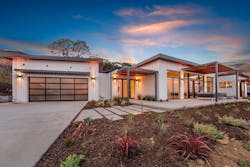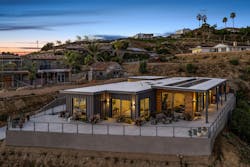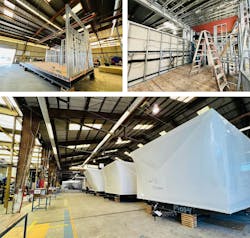Dvele—a California-based manufacturer of prefab, modular homes—got started by bringing two building concepts together: high performance and factory construction.
In 2018, Brandon Weiss, a third-generation U.S. home builder-developer who built high-performance homes in the Chicago area, joined forces with brothers Kurt and Kris Goodjohn, who had owned and sold a prefab home business in British Columbia. With their combined expertise, the three men cofounded Dvele (meaning “dwell” in Norwegian).
Today, Dvele touts a slew of benefits from its factory-built homes: They’re 84% more efficient than conventional construction and cost 30% less to own over the home’s 100-year lifespan, according to the company. Dvele achieves those and other benefits in an automated factory that takes just 16 weeks to produce an entire house.
Building Airtight Modular Homes
As explained by Weiss, chief innovation officer, Dvele builds airtight, well-insulated homes that exceed Passive House standards, which helps reduce energy demands compared to traditional homes. Dvele’s homes both receive fresh, filtered air and exhaust stale air from the rooms that produce the most moisture and odors (the kitchens, bathrooms, and laundry rooms). A heating recovery system uses the exhausted air to pre-heat and pre-cool incoming air before it’s delivered to the home.
The all-electric homes use heat pumps for heating and cooling, as well as for hot water and dryers. And they come with solar panels and batteries, so the homes can be completely self-powered in the event of grid outages or shutdowns.
Dvele also focuses on resiliency—making homes resilient to extreme climate or weather events such as fires, earthquakes, and tornados. The company achieves fire resiliency in part by eliminating ventilated crawl spaces and attics. “A lot of homes don’t burn because of direct flame contact but because of embers getting into the assemblies, so we cut off those pathways to make the homes more fire resilient,” Weiss says.
Dvele’s end-to-end solution begins with clients selecting from more than 15 design options, which include both exterior and interior designs, on the company’s website. “Our team of interior designers pick palettes that are modern and in high demand as well as timeless,” Weiss says. The options range from single-module, 1-bed, 1-bath homes of 705 sf that start at $310,000, to seven-module, 4-bed, 4.5-bath homes of 3,957 sf that start at $1.05 million.
Once the customer chooses the design, Dvele handles the entire process—from permitting to factory construction to onsite delivery to post-occupancy check-ins that ensure the homes perform as modeled. “We’re the sole source of accountability for our clients,” Weiss says.
Modular Factory Process
In Dvele’s automated factory outside Los Angeles, machines first produce the various building components, such as the studs, trusses, and steel superstructures. The factory panelizes the ceilings, floors, and walls, then brings all the elements together to form the module. After the mechanical systems are installed, the module gets insulated and then gradually receives all the remaining elements—drywall, paint, trim, flooring, and cabinetry—until the heating/cooling system and appliances are installed. Dvele installs the foundations concurrently with the factory work, which helps condense the schedule.
For a single-module home, all that’s left is to ship the module to the site and then connect it to the electricity, sewer, and water. For multi-module homes, the project is 90% complete by the time it leaves the factory. That high degree of factory completion helps ensure cost and quality control, Weiss says.
In addition, Dvele offers interior design services, which can help improve the homes’ performance during ownership. “We build extremely healthy homes, so if people bring in any old furniture, they can negate some of the positive impacts,” Weiss says. Dvele’s designers consider the quality of furnishings, and the chemicals inside them, to help optimize the homes’ air quality.
So far, Dvele has produced about 300 modules, mostly for California, Colorado, and Utah. Next year, it plans to create about 240 modules. But that output will ramp up significantly with Dvele’s new facility in Montana, which Weiss says will produce a conservative estimate of 1,200 modules per year. The Montana factory is expected to open in the first half of 2025.
While most of Dvele’s customers to date have been individual homeowners, the company aims to produce more homes for developers who, as Weiss says, might be interested in simpler building solutions amid today’s labor and supply chain challenges.


